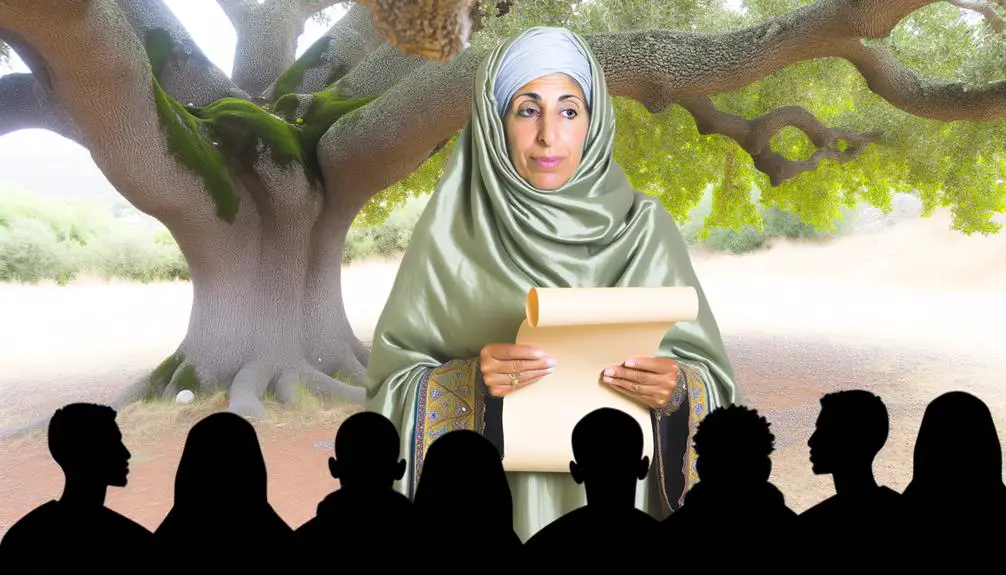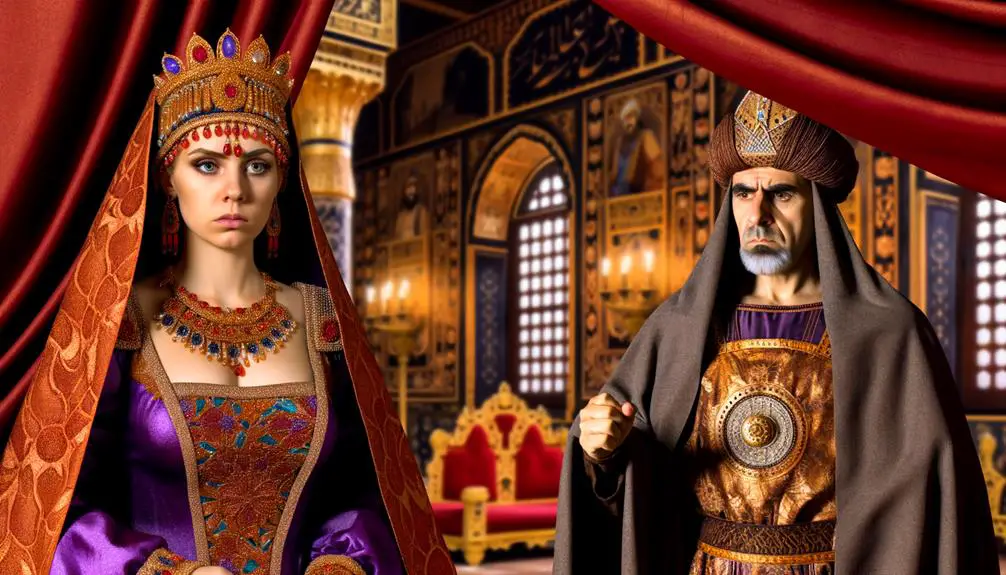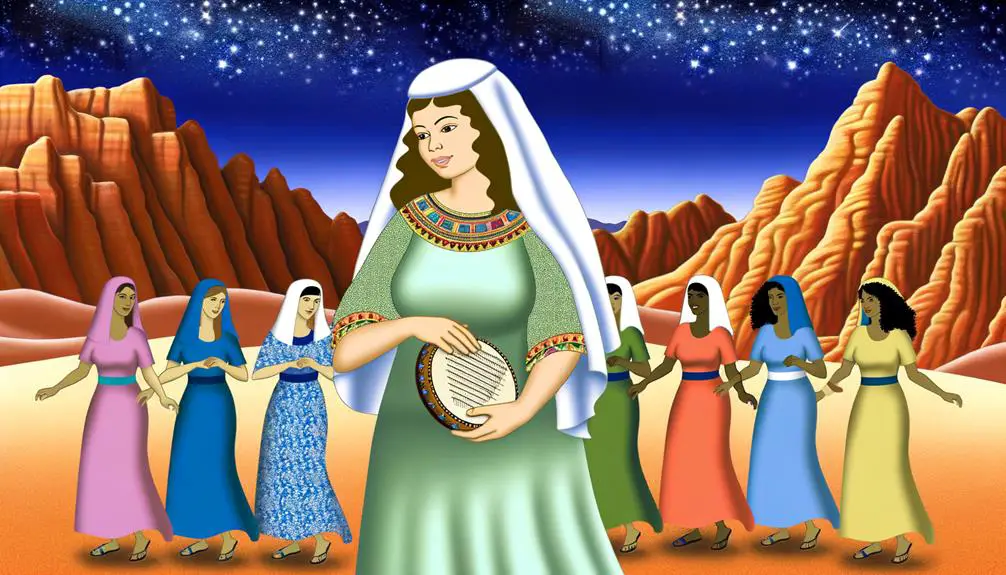The stories of Deborah, Ruth, Esther, Mary, and Miriam reveal the profound influence of female heroes in the Bible, uncovering…

Female Heroes in the Bible
You'll discover several inspiring female heroes in the Bible, each embodying unique virtues and strengths. Deborah, a prophetess, demonstrated leadership skills and military wisdom, guiding Israel with her judgments. Ruth showcased unwavering loyalty, integrating fully into a foreign community, which influenced generations. Esther combined courage with strategic acumen, risking her life to save her people. Mary, the mother of Jesus, symbolized humility and spiritual devotion, standing by her son through his crucifixion. Miriam, a prophet and leader, played a pivotal role in her people's journey towards liberation. Each story adds a rich layer to the fabric of biblical narratives, inviting further exploration into their lives and impacts.
Key Takeaways
- Deborah showcased military strategy and judicial wisdom as a leader and prophetess in the Book of Judges.
- Ruth exemplified loyalty and integration into a new community, leaving a significant cultural impact.
- Esther demonstrated courage and strategic planning to save her people from danger.
- Mary, the mother of Jesus, embodied deep faith and humility, standing by Jesus during his crucifixion.
- Miriam led through her prophetic role and was pivotal in the journey toward liberation, as depicted in her celebratory song.
Deborah: Prophetess and Leader

In the Book of Judges, Deborah stands out as a prophetess and leader who skillfully guided Israel through a period of oppression. You'll find her story not just compelling but also illustrative of profound leadership qualities, particularly in military strategy and judicial wisdom. As a judge, Deborah didn't just settle disputes; she also provided moral and spiritual guidance, guiding her people through ethical dilemmas and societal challenges with a wisdom that was deeply respected.
Her role extended into the domain of military leadership, a rare responsibility for a woman of her time. Deborah's strategic acumen was clearly displayed during the battle against the Canaanite army led by Sisera. She didn't only inspire confidence in her general, Barak; she also offered strategic insights that were vital for their victory. This wasn't merely about engaging in combat; it was about understanding the dynamics of power, the geography of the battlefield, and the morale of her troops.
Deborah's story encourages you to look beyond traditional roles and recognize the potential for leadership in various forms. Her ability to lead in multiple arenas — judicial and military — underlines a versatility that challenges many of the conventional narratives about leadership in her time and in ours.
Ruth: Loyalty and Devotion
Ruth's tale exemplifies unwavering loyalty and devotion, setting a profound example of steadfastness in relationships and spiritual commitment. As you explore further into her story, you'll see how her decisions profoundly influenced the family dynamics and cultural norms of her time. Ruth, a Moabite widow, chooses to stay with Naomi, her Israelite mother-in-law, despite the easier option of returning to her own family and culture. This choice isn't just personal but is loaded with social implications.
Her journey with Naomi back to Bethlehem is a demonstration of her integral role in transforming not only her life but also those around her. By integrating into a foreign community and adopting their customs, Ruth challenges the stereotypes and prejudices of her time. Her actions forge a path that leads to acceptance and respect within her new community.
Moreover, Ruth's story doesn't just resonate within the confines of personal and familial loyalty; it also leaves a lasting cultural impact. Her eventual marriage to Boaz, a relative of Naomi, reinforces the values of duty and faithfulness across different generations and societies. Through Ruth, you're invited to reflect on the power of loyalty and its ability to transcend personal and cultural boundaries, enriching the lives it touches.
Esther: Courage and Sacrifice

Facing immense peril, Esther's story embodies the epitome of courage and the depth of sacrifice required when one's faith and people are at stake. As you explore her narrative, you'll find that Esther, known for her royal beauty, wasn't just a queen by title, but a savior through her actions. Her intelligence and bravery shine through when she reveals a strategic plan to save her people from annihilation.
The turning point in her story involves strategic fasting, a move you might interpret as a mere act of faith. However, it was a calculated effort to unite her community and seek divine intervention in a time of desperation. This fasting wasn't just spiritual; it served as a rallying cry for collective action and solidarity among her people.
Esther's approach to confronting King Ahasuerus about Haman's malicious plot showcases her diplomatic acumen. Her ability to balance royal decorum with bold, personal sacrifice is a tribute to her strength and foresight. By inviting the king to banquets, she carefully crafted an environment conducive to persuasion, ultimately exposing Haman's scheme at the perfect moment.
Your understanding of Esther's legacy teaches you that true leadership often requires putting one's life on the line for the greater good.
Mary: Mother of Jesus
Mary, the mother of Jesus, stands as a pillar of strength and obedience in Biblical narratives, embodying the virtues of faith and humility throughout her life. Her story is a profound example of spiritual obedience and Mary's humility, essential traits that define her role in the scriptures and her impact as a female biblical hero.
You'll find that her life was marked by several key moments where these virtues were prominently displayed:
- Annunciation: Mary's acceptance of her role in the divine plan, despite the social risks, underscores her incredible humility and obedience.
- Visitation: Her journey to Elizabeth reflects a proactive approach to service, guided by faith.
- Nativity: Giving birth in a manger, Mary epitomizes humility, welcoming the Savior in the most humble circumstances.
- Presentation in the Temple: Her adherence to Jewish law further illustrates her deep spiritual obedience.
- At the Cross: Standing by Jesus during His crucifixion, despite the unimaginable pain, showcases her unwavering faith and strength.
Through these events, Mary's actions speak volumes about her character. Her life encourages you to embrace humility and obedience in your own spiritual journey, reflecting on how deep faith can profoundly shape one's actions and reactions in challenging times.
Miriam: Prophet and Leader

Exploring the Israelites with her prophetic gifts, Miriam exemplifies the strength and leadership qualities of a pivotal biblical heroine. As you investigate further into her story, you'll discover her role wasn't just as Moses' sister or a background figure; she was a leader in her own right. Her musical leadership, particularly through the 'Song of Miriam,' highlights her influence and ability to inspire the Israelites through celebratory song and dance after crossing the Red Sea. This event not only solidifies her role as a prophet but also underscores the power of music as a form of spiritual and communal expression.
Furthermore, water symbolism is deeply intertwined with Miriam's narrative. From watching over her brother Moses in the Nile to the well that Jewish tradition suggests followed the Israelites in the desert due to her righteousness, water represents both life and protection in her story. This symbolism enhances your understanding of Miriam's protective and nurturing nature. Her actions and the motifs associated with her paint a picture of a woman who was not just a witness to her people's trials but an active participant and leader in their journey toward liberation.
Frequently Asked Questions
How Did Societal Norms Affect These Women's Leadership Roles?
Societal norms, shaped by patriarchal constraints and cultural expectations, greatly influenced these women's leadership roles, often limiting or defining their opportunities and recognition within their communities and historical narratives.
What Are the Lesser-Known Female Heroes in the Bible?
Exploring lesser-known figures, you'll find characters whose genealogical importance and cultural symbolism are profound yet understated. Analyze their stories to understand their subtle yet significant impacts on their contemporaries and beyond.
How Do Modern Interpretations Vary From Traditional Views?
Modern interpretations are like prisms, refracting traditional views through the lens of cultural reinterpretation and evolving scriptural translations. You'll notice significant shifts in perception, revealing deeper, sometimes contrasting layers of understanding.
What Challenges Did These Women Face Within Their Own Communities?
You'd find that these women often grappled with strict gender expectations and religious constraints, challenging their roles and pushing boundaries within their communities to achieve what was often seen as unattainable.
How Have These Biblical Figures Influenced Contemporary Feminist Thought?
You'd think ancient texts wouldn't echo in modern halls, yet these figures have shaped gender representation and theological impact, enriching feminist discourse with historical depth and nuanced perspectives. Their stories transcend time, inspiring many.



Sign up